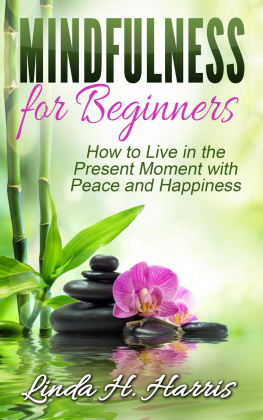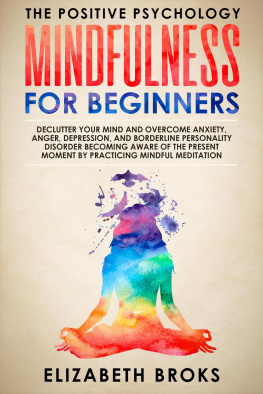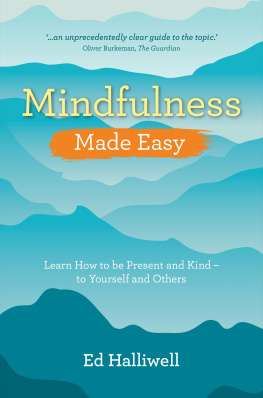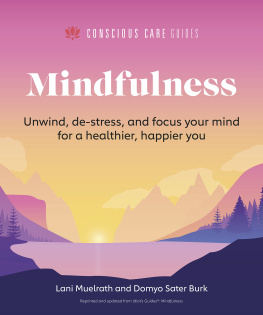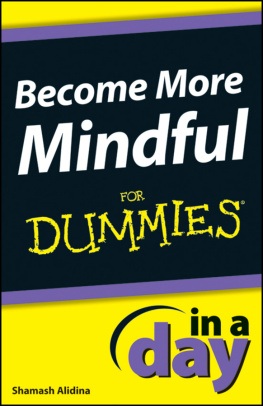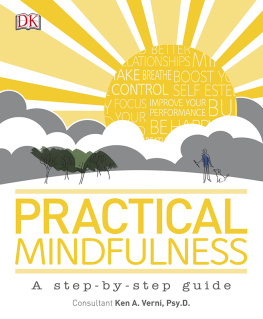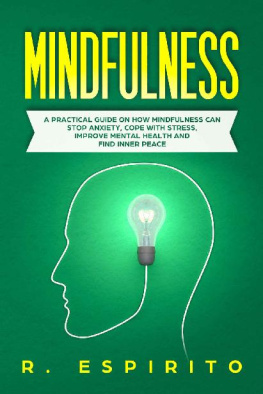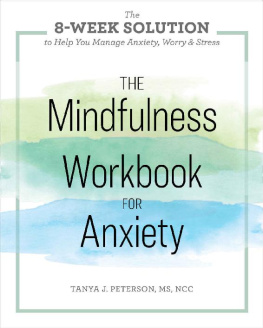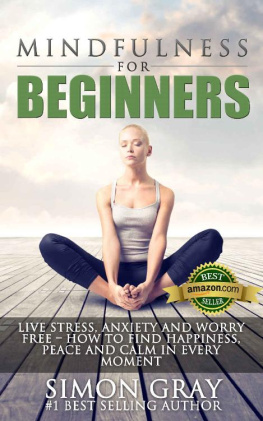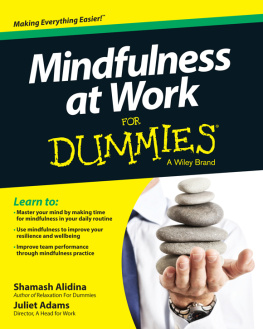Contents
Mindfulness:
100+ Amazing Mindfulness Tips, Exercises & Resources. Bonus: 200+ Mindfulness Quotes to Live By! (Mindfulness for Beginner's, Mindfulness Meditation, Yoga & Mindfulness, Anxiety & Mindfulness)
Kevin Gise 2016
All rights reserved. No part of this book may be reproduced in any form without permission in writing from the author. Reviewers may quote brief passages in reviews.
Disclaimer:
This book is for informational purposes only and the author, his agents, heirs, and assignees do not accept any responsibilities for any liabilities, actual or alleged, resulting from the use of this information.
This report is not professional advice. The author encourages the reader to seek advice from a professional where any reasonably prudent person would do so. While every reasonable attempt has been made to verify the information contained in this eBook, the author and his affiliates cannot assume any responsibility for errors, inaccuracies or omissions, including omissions in transmission or reproduction.
Any references to people, events, organizations, or business entities are for educational and illustrative purposes only, and no intent to falsely characterize, recommend, disparage, or injure is intended or should be so construed. Any results stated or implied are consistent with general results, but this means results can and will vary. The author, his agents, and assigns, make no promises or guarantees, stated or implied. Individual results will vary and this work is supplied strictly on an at your own risk basis.
Thank You!
I'd like to begin by thanking you for deciding to read one of the books I've written.
I know there are a ton of options to choose from and how valuable your time is. I'm very grateful that you've decided to take a little time out of your day to read my book.
As a gift to you, I have an additional FREE E-book that you can get by joining my mailing list.
Click Here To Download
Introduction
Mindfulness is an idea that's been around for a long time and has begun to gain more traction with the general public over the past few years. It's a way of thinking, and a set of techniques, a person can use to help improve their life in a meaningful way. Perhaps, you feel cut off from your feelings or constantly overwhelmed by them. Maybe, you keep falling from one bad situation to another, or you're having difficulty interacting with those around you. Whatever your set of circumstances, the information in this book can help you.
Practicing mindfulness and making it a part of your daily life will let you regain control of your feelings and behavior. It will empower you to overcome any adversity that comes your way. It will improve your overall sense of well-being while also calming your mind and spirit.
This book will touch on a lot of different mindfulness topics, along with providing you some resources and inspirational quotes to help you during the course of your journey. This is not a change that happens overnight. It will take some time and diligence on your part. However, the work you put in is well worth it in the long run.
I'm excited to begin. Let's get started!
Chapter One: An Introduction to Mindfulness
An Introduction to Mindfulness
What is mindfulness? Well, mindfulness is the awareness of your mind at any given moment. What does that mean in practical terms? It means being able to step back from having any type of immediate response to a situation, and being aware of how you feel, what you're thinking, along with being aware of what is happening in your surroundings. Mindfulness is paying attention to both yourself and the world going on around you. It's about experiencing things instead of just witnessing them happen.
Mindfulness has a few different components that I'll break down and discuss a little further.
Being In The Moment
This is the ability to live in the present, fully aware that you cannot change the past, knowing that your future has yet to be written. Both your thoughts and feelings are valuable and valid because they are occurring at the moment.
Attentiveness
This is the ability to really begin noticing what is going on around you. It can be something as simple as feeling the texture of the floor with your feet, or feeling your heart beating.
Being Non-Judgmental
One of the goals of becoming mindful is being aware of things without judging them as bad or good automatically. Being aware of the entire situation going on around you will allow you to take appropriate action.
Compassion
It can be easy to give into our negative thoughts and feelings about not only our self but about the other people around us. To show compassion is to recognize your own limitations and fallibility as a person, and to show forgiveness and understanding for both yourself and others.
Being Non-Reactive
This is similar to being non-judgmental. You don't want to immediately react to a situation the moment it occurs. I'm not saying don't react at all. I'm saying that you want to take a moment to assess the situation and experience the moment that is going on around you. Once you've done that, you can then act appropriately.
Some skeptics may say what if you're in immediate danger, don't you want to react immediately? The answer I always give, is in the vast majority of situations you'll encounter throughout your lifetime, having the ability to stay in control of your actions and emotions, will allow you to much better assess and respond to any situation then you'd be able to do if you were simply reacting based on fear.
The Benefits of Mindfulness
In this section, I'm going to discuss some of the many benefits associated with living a more mindful lifestyle. These benefits have all been researched extensively and have empirical data to back up their beneficial claims.
Reduced Negative Thinking
Studies have shown that mindfulness helps reduce rumination and negative thinking. In addition to this, people who practice mindfulness experience fewer symptoms of depression.
Stress Reduction
There's been over 40 medical studies that have shown that practicing mindfulness will help to alleviate stress. It's been shown that practicing mindfulness on a daily basis can alter your cognitive processes, helping to decrease both anxiety and stress long term.
Improved Memory Function
Being mindful will help to boost your working memory. Studies have shown that people who participate in mindfulness meditation have substantial increases in their memory capacity over time.
Focus
Another benefit is an enhanced ability to focus and an increased ability to suppress any distracting information. Mindfulness has been shown to correlate directly with better attentional functioning and cognitive flexibility.
Less Emotional Reactivity
People who practice mindfulness develop skills to become more self-observant than those around them. It also allows people to better handle negative or stressful situations without letting their emotions overcome them.
Stronger Relationships
Several studies have shown that mindfulness has a positive effect on relationship satisfaction. Being mindful allows you to respond well under relationship stress instead of lashing out. It also allows you to communicate your emotions better to your partner. Mindfulness has also been shown to help protect a person from the stressful emotional effects that occur during relationship conflict.
Besides the benefits listed above, mindfulness has also been shown to help enhance a person's morality, self-insight, fear modulation, intention and immune functioning. As you can see, the benefits of being mindful are abundant and well worth the time and effort you put into practicing it.
Chapter Two: How to Get Started On The Path to Mindfulness



